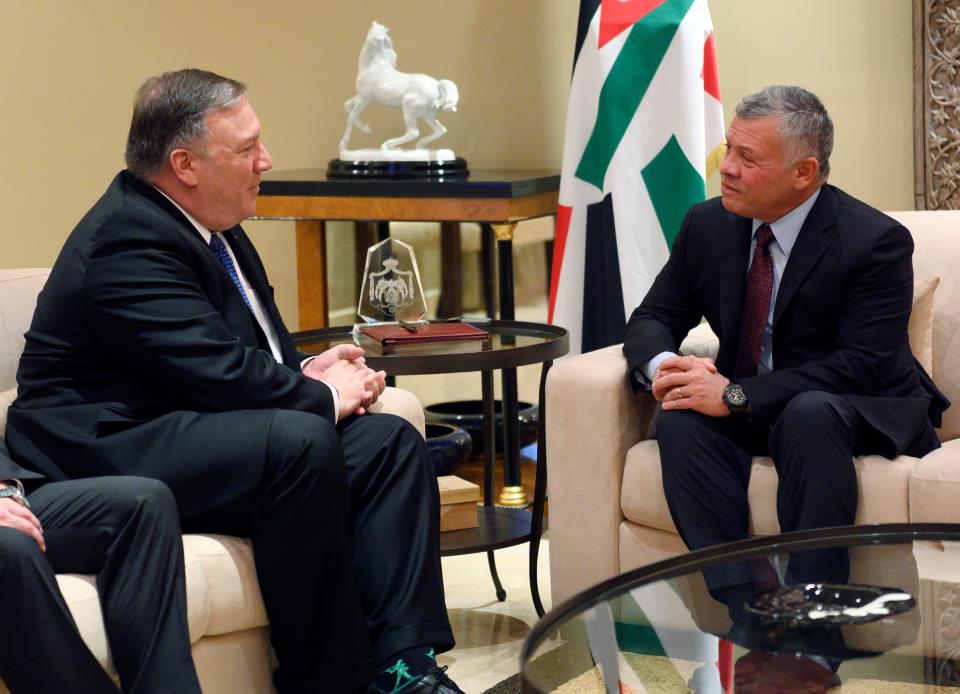As Trump's timeline for Syria withdrawal slips, U.S. allies are nervous, angry, confused
WASHINGTON – Turkey’s president is fuming. Israeli leaders are nervous. Syrian Kurds are terrified.
That’s the global state-of-play three weeks after President Donald Trump abruptly announced a decision to withdraw U.S. troops from Syria.
Secretary of State Mike Pompeo and Trump National Security Adviser John Bolton are now on separate swings through the Middle East, where they’re both trying to calm jittery U.S. allies – and to walk back the president’s statements.
“There’s been a lot of noise about this withdrawal from Syria, and we want to make sure they understand completely what that means,” Pompeo told CNBC in an interview Monday before leaving for the diplomatic blitz.
That “noise” started on Dec. 19, when Trump abruptly announced a decision to withdraw all U.S. troops from Syria, where they have been fighting ISIS. Trump declared three weeks ago the 2,000 American troops in Syria are “all coming back, and they’re coming back now” and that that ISIS had been vanquished – an assertion experts say is inaccurate.
Bolton contradicted the president during a stop in Israel on Sunday – saying U.S. troops would only leave Syria once ISIS is completely eradicated and the U.S. had secured assurances from Turkey that it would not attack Kurdish fighters allied with the U.S. The Syrian Kurds have been America's most important ally in the fight against ISIS.
“There are objectives that we want to accomplish that condition the withdrawal,” Bolton told reporters in Jerusalem.

Bolton then went to Ankara to ask Turkey not to “slaughter the Kurds,” as Pompeo put it last week. Turkish President Recep Tayyip Erdogan responded angrily to Bolton’s entreaty, noting that Turkey views the Kurdish fighters as a terrorist group.
“It is not possible to accept or swallow the message given by Bolton,” Erdogan told lawmakers in Turkey’s parliament on Tuesday.
Pompeo may get a similarly chilly reception on his eight-country tour of the Middle East, which started Tuesday in Jordan and will include stops in Egypt, Saudi Arabia and Kuwait. Trump’s chief diplomat said his main goal is to reassure America’s Arab allies that the U.S. is not abandoning the Middle East – specifically its efforts to curb Iran’s influence in the region.
“Our mission set in the region remains unchanged,” Pompeo told reporters traveling with him on the trip. He declined to say what timetable, if any, the Trump administration has set for America's withdraw from Syria. And he insisted there was no difference between Trump's call for a speedy withdraw and Bolton's conditional timeline.
But Middle East experts say Bolton's conditions will be difficult to meet and could mean that U.S. troops remain in Syria indefinitely. But Trump has undermined Pompeo and Bolton, with allies unsure of who or what to believe, they argued.
In addition to the troop withdraw in Syria, Trump said last week that “Iran can do whatever they want” in Syria. That was particularly unsettling to Israeli leaders, who fear that Iran is trying to get a military foothold in Syria.
Natan Sachs, director of the Center for Middle East Policy at the Brookings Institution, a liberal think tank, said Trump showed his true colors when he announced the Syria withdrawal.
“His instincts about the Middle East are quite consistent over time … which is to say he doesn’t quite see the point,” Sachs said. “He would rather not have anything to do with the mess called the Middle East.”
Sachs said Trump has built up considerable goodwill with U.S. allies in the Middle East because of other policy decisions. But “it’s not going to be easy for Pompeo to calm them” over Trump’s latest actions, he said.
Gerald Feierstein, a former ambassador to Yemen and now a senior vice president at the Middle East Institute, said Trump's statements can't be taken back, no matter how hard Pompeo and Bolton try to tweak the president's message.
“None of these people can say that they speak authoritatively for where the Trump administration is,” Feierstein said. “He can upend anything that they say in one tweet.”
He said Trump’s moves will have far-reaching consequences beyond America’s influence in the Middle East.
“The real damage … is that it has once again reduced the sense that the United States is a reliable partner,” Feierstein said. “And what you’re seeing is an increasing move on the part of our traditional friends and partners in the region to hedge their bets – to look at Moscow to look at Beijing” for alliances.
Related:
Trump says former Soviet Union was 'right' to invade Afghanistan, prompting ridicule
This article originally appeared on USA TODAY: As Trump's timeline for Syria withdrawal slips, U.S. allies are nervous, angry, confused

